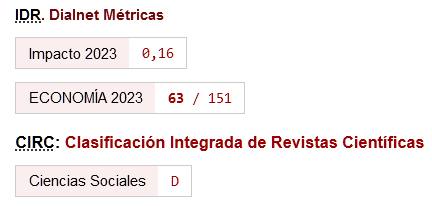Estrategias alternativas en los debates sobre género y desarrollo.
Palabras clave:
Género, Desarrollo, Empoderamiento, CapacidadesResumen
Las políticas de desarrollo aplicadas a los países periféricos han tenido una visión explícita o implícita del papel que tenían que jugar las mujeres en el desarrollo de sus países. Tras hacer un repaso crítico a las principales estrategias, se analizan las alternativas que desde los años 80 se han planteado desde los movimientos de mujeres y desde quienes han tenido una visión crítica con la ortodoxia del desarrollo, explicando qué aportan estas estrategias alternativas a la lucha contra la subordinación de las mujeres.
Descargas
Citas
Agarwal, Bina (1997): ""Bargaining" and Gender Relations: Within and Beyond the Household", Feminist Economics, vol.3 (1), pp. 1-51. https://doi.org/10.1080/135457097338799
Agarwal, Bina (2003): "Gender and Land Rights Revisited: Exploring New Prospects via de State, Family and Market" in Shahra Razavi (ed.) Agrarian Change, Gender and Land Rights, Oxford: UNRISD Blackwell Pub. Ltd., pp. 184-224. https://doi.org/10.1111/1471-0366.00054
Bisnath, Savitri y Elson, Diane (2000): Women's Empowerment Revisited. Background Paper for Progress of the World's Women, A New Biennial Report, UNIFEM. En http://www.undp.org/unifem, 1/3/01.
Buvinic, Mayra (1983): "Women's issues in Third World Poverty: A policy analysis" en Mayra Buvinic, Margaret A. Lycette y William Paul McGreevey (eds.) Women and Poverty in the Third World, Baltimore: The Johns Hopkins University Press, pp. 14-33.
Buvinic, Mayra (1986): "Projects for Women in the Third World: Explaining their Misbehavior", World Development, Vol. 14 - Nº 5, pp. 653-664. https://doi.org/10.1016/0305-750X(86)90130-0
Dema-Moreno, Sandra (2009): "Behind the Negotiations: Financial Decision-Making Processes in Spanish Dual-Income Couples", Feminist Economics, vol. 15 (1), pp. 27-56. https://doi.org/10.1080/13545700802620575
Elson, Diane (1991): Male Bias in the Development Process, Manchester: Manchester University Press.
Kabeer, Naila (1999): "Resources, Agency, Achievements: Reflections on the Measurement of Women's Empowerment", Development and Change, vol. 20, pp. 435-464. https://doi.org/10.1111/1467-7660.00125
Kandiyoti, Deniz (2007): "Political fiction meets gender myth: post-conflict reconstruction, 'democratization' and women's rights" en Andrea Cornwall, Elizabeth Harrison y Ann Whitehead (eds.) Feminisms in development: Contradictions, contestations & challenges, London/New York: Zed Books, pp. 191-200. https://doi.org/10.5040/9781350220089.ch-015
León, Magdalena (comp.) (1997): Poder y empoderamiento de las mujeres, Bogotá: Edit. Tercer Mundo.
Molyneux, Maxine (2002): "Gender and the Silences of Social Capital: Lessons from Latin America", Development and Change, vol. 33(2): 167-188. https://doi.org/10.1111/1467-7660.00246
Molyneux, Maxine (2007): "The chimera of success: gender ennui and the changed international policy environment" en Andrea Cornwall, Elizabeth Harrison y Ann Whitehead (eds.) Feminisms in development: Contradictions, contestations & challenges, London/New York: Zed Books, pp. 225-240. https://doi.org/10.5040/9781350220089.ch-018
Moser, Caroline (1991): "Las mujeres en la planificación del desarrollo. Necesidades prácticas y estratégicas de género" en Políticas de cooperación para el desarrollo y participación de las mujeres, Bilbao: Hegoa, pp. 11-40.
Nussbaum, Martha (1999): "Mujeres e igualdad según la tesis de las capacidades", Revista Internacional del Trabajo, vol. 118, nº 3, pp. 253-273. https://doi.org/10.1111/j.1564-913X.1999.tb00133.x
Nussbaum, Martha (2002): Las mujeres y el desarrollo humano. El enfoque de las capacidades, Barcelona: Ed. Herder (2000 en inglés).
Nussbaum, Martha (2003): "Capabilities as Fundamental Entitlements: Sen and Social Justice", Feminist Economics, vol. 9, nº 2-3, pp. 33-59. https://doi.org/10.1080/1354570022000077926
Parpart, Jane L.; Rai, Shirin y Staudt, Kathleen (2002): "Rethinking em(power)ment, gender and development. An Introduction" en Jane Parpart, Shirin Rai y Kathleen Staudt (eds.) Rethinking empowerment, gender and development in a global/local world. New York & London: Routledge, pp. 3-21.
Peter, Fabienne (2003): "Gender and the Foundations of Social Choice: The Role of Situated Agency", Feminist Economics, vol. 9, nº 2-3, pp. 13-32. https://doi.org/10.1080/1354570022000078006
Sen, Amartya K. (1990a): "Development as Capability Expansion" en Keith Griffin y John Knight (ed.) Human Development and the International Development Strategy for the 1990s, London: Macmillan, pp. 44-58. https://doi.org/10.1007/978-1-349-21136-4_3
Sen, Amartya K. (1990b): "Gender and Cooperative Conflicts" en Irene Tinker (ed.) Persistent Inequalities: Women and World Development, New York: Oxford University Press, pp. 123-149.
Sen, Amartya K. (2004): "Capabilities, Lists, and Public Reason: Continuing the Conversation", Feminist Economics, vol. 10, nº 3, pp. 77-80. https://doi.org/10.1080/1354570042000315163
Sen, Gita (1998): "El empoderamiento como un enfoque a la pobreza", Ediciones de las Mujeres, nº 26, pp. 121-139.
Zabala, Idoye (1999): "Un viaje a través del tiempo: 30 años de pensamiento económico feminista en torno al desarrollo" en Cristina Carrasco Mujeres y Economía: Nuevas perspectivas para viejos y nuevos problemas. Barcelona: Icaria-Antracyt, pp. 337-363.
Zabala, Idoye (2005): La perspectiva de género en los análisis y en las políticas del Banco Mundial: Su evolución y sus límites, Bilbao: Servicio Editorial de la Universidad del País Vasco.
Descargas
Publicado
Cómo citar
Número
Sección
Licencia
Esta licencia permite a terceros compartir (copiar y redistribuir el material en cualquier medio o formato) y adaptar (remezclar, transformar y crear a partir del material para cualquier finalidad, incluso comercial), siempre que se reconozca la autoría y la primera publicación en esta revista (La Revista, DOI de la obra), se proporcione un enlace a la licencia y se indique si se han realizado cambios en la obra.







